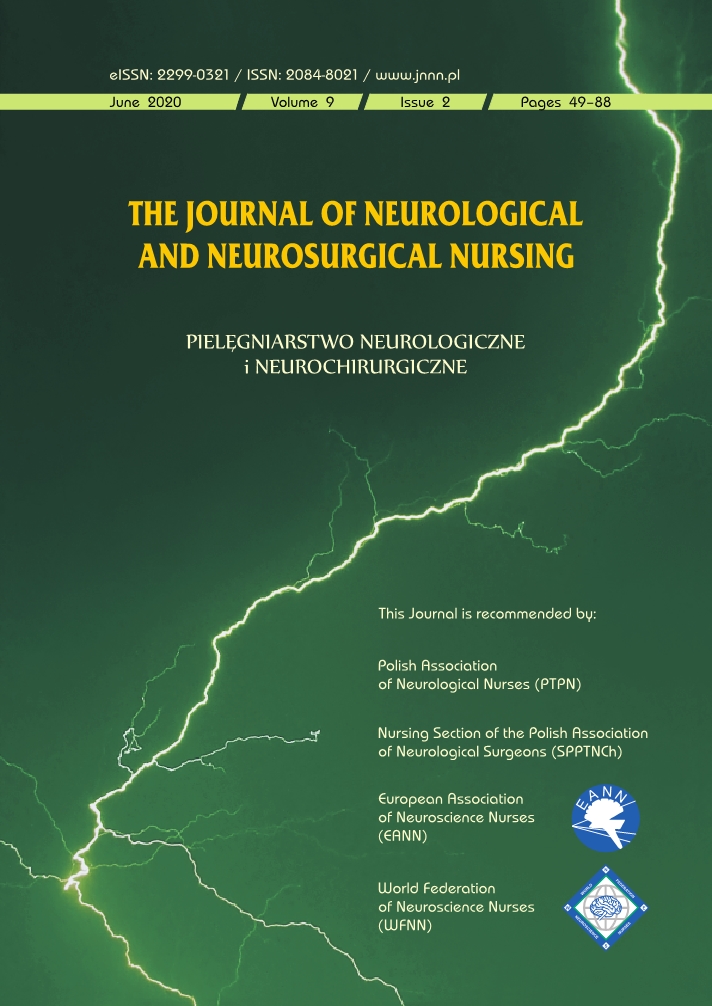Ocena funkcjonalna pacjentów w starszym wieku po przebytym udarze mózgu
DOI:
https://doi.org/10.15225/PNN.2020.9.2.2Słowa kluczowe
ocena funkcjonalna, wiek starszy, udar mózguAbstrakt
Wstęp. Przebyta choroba neurologiczna często wywiera silny wpływ na dalsze życie chorego w czterech podstawowych wymiarach: funkcjonalnym, psychicznym, społecznym i duchowym.
Cel. Celem pracy była ocena funkcjonalna chorego w starszym wieku po przebytym udarze mózgu oraz zweryfikowanie czy wybrane czynniki demograficzne i kliniczne mają znaczący wpływ na wydolność funkcjonalną.
Materiał i metody. Badania przeprowadzono w Katedrze i Klinice Geriatrii Szpitala Uniwersyteckiego nr 1 im. dr. A. Jurasza w Bydgoszczy na grupie 88 pacjentów, po przebytym udarze mózgu. Ocenę stanu funkcjonalnego dokonano za pomocą Barthel Index — BI, ocenę zaburzeń depresyjnych dokonano za pomocą Geriatric Depression Scale — GDS a ocenę wyższych czynności poznawczych dokonano za pomocą Mini-Mental State Examination — MMSE.
Wyniki. W wyniku przeprowadzonej analizy statystycznej, nie stwierdzono istotnych statystycznie różnic w wydolności funkcjonalnej chorego w poszczególnych pomiarach (pierwszym i drugim) ANOVA Friedmana (N = 88, df 1) = 0,32; p = 0,582, co oznacza, że pacjenci klasyfikowani byli do tych samych grup wydolności funkcjonalnej, uzyskując zbliżony wynik w powtórnych pomiarach. Stwierdzono, że płeć, wiek i liczba chorób towarzyszących istotnie statystycznie wpływa (p < 0,05), na stan funkcjonalny badanych. Nie stwierdzono istotnego statystycznie wpływu miejsca zamieszkania (p > 0,05) oraz sytuacji rodzinnej (p > 0,05) na stan funkcjonalny badanych. Stwierdzono również, istotną statystycznie korelację pomiędzy zaburzeniami depresyjnymi (rang Spearmana -0,438; p < 0,05) i zaburzeniami wyższych czynności poznawczych (rang Spearmana -0,548; p < 0,05) a wydolnością funkcjonalną.
Wnioski. W większości przypadków chorzy w starszym wieku po przebytym udarze mózgu, uzyskują samodzielność funkcjonalną. Mężczyźni wykazywali lepszą sprawność funkcjonalną. Starszy wiek oraz większa liczba chorób współistniejących pogorsza sprawność funkcjonalną. Stwierdzono również, wzajemną zależność stanu funkcjonalnego od zaburzeń funkcji poznawczych i stanu emocjonalnego. (PNN 2020;9(2):59–64)
Bibliografia
Skalska A. Ograniczenie sprawności funkcjonalnej osób w podeszłym wieku. Zdrowie Publiczne i Zarządzanie. 2011;9(1):50–59.
Abrams W.B., Beers M.H., Berkow R. (Red.), MSD. Podręcznik geriatrii. Wyd. Edra Urban & Partner, Wrocław 1999.
Bień B., Wojszel Z.B., Wilmańska J., Polityńska B. Epidemiologiczna ocena rozpowszechnienia niesprawności funkcjonalnej u osób w późnej starości a świadczenie opieki. Gerontol Pol. 1999;7(2):42–47.
Wawrzyniak S., Wawrzyniak K. Wpływ wybranych czynników społeczno-demograficznych na przebieg udaru niedokrwiennego mózgu. Udar Mózgu. 2006;8(1):22–27.
Jaracz K., Kozubski W. Jakość życia po udarze mózgu. Część I — badanie prospektywne. Udar Mózgu. 2001;3(2):55–62.
Filipska K., Skrzypek-Czerko M., Cwiekala-Lewis K., Ślusarz R. Klinimetryczna ocena wydolności funkcjonalnej i jakości życia pacjentów z udarem mózgu — przegląd badań. Pielęg Neurol Neurochir. 2019;8(2):86–90.
Mahoney F.I., Barthel D.W. Functional evaluation: the Barthel Index. Md State Med J. 1965;14:56–61.
Yesavage J.A., Brink T.L., Rose T.L. et al. Development and validation of a geriatric depression screening scale: A preliminary report. J Psychiatr Res. 1983;17(1):37–49.
Rajtar-Zembaty A., Sałakowski A., Rajtar-Zembaty J. Związek między funkcjami wykonawczymi a sprawnością fizyczną oraz funkcjonalną u osób po 60 roku życia. Prz Lek. 2016;73(9):627–631.
Przychodzka E., Grudzień A., Celej-Szuster J., Turowski K. Ocena wydolności funkcjonalnej chorych po udarze mózgu. Gerontol Pol. 2019;27:272–279.
Bartoszek A., Siemko E., Kachaniuk H., Kocka K., Stanisławek A. Analiza czynników określających poziom wydolności samoobsługowej pacjentów oddziału neurologii. Med Og Nauk Zdr. 2013;19(2):147–152.
Haor B., Rybka M., Antczak A., Kwasiborska A. Uwarunkowania sprawności funkcjonalnej pacjentów po przebytym incydencie udaru krwotocznego mózgu. Pielęg Neurol Neurochir. 2015;4(2):62–68.
Rynkiewicz M., Rogulska U., Czernicki J. Ocena zmian sprawności funkcjonalnej osób we wczesnym okresie po udarze mózgu. Prz Med Uniw Rzesz Inst Leków. 2011;2:325–339.
Miller E. Ocena funkcjonalna skuteczności wczesnej rehabilitacji po udarze mózgu — obserwacja półroczna. Prz Med Uniw Rzesz. 2007;3:205–210.
Pobrania
Opublikowane
Jak cytować
Numer
Dział
Licencja

Utwór dostępny jest na licencji Creative Commons Uznanie autorstwa – Bez utworów zależnych 4.0 Międzynarodowe.
Statystyki
Liczba wyświetleń i pobrań: 621
Liczba cytowań: 0
